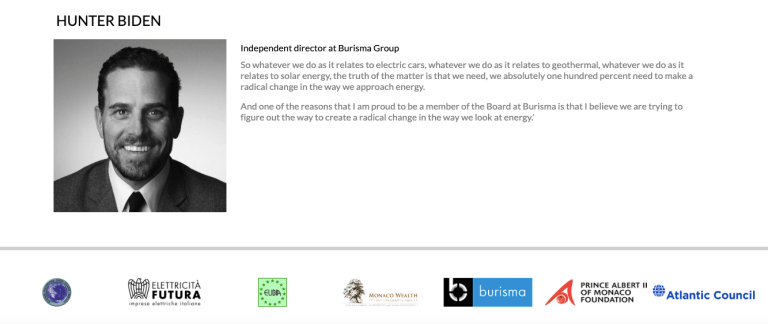This piece was reprinted by OpEd News with permission or license. It may not be reproduced in any form without permission or license from the source.
Addressing the parliament in Kiev, Biden declared that "corruption can have no place in the new Ukraine," stating that the "United States has also been a driving force behind the IMF, working to provide a multi-billion package to help Ukraine.."
That same month, Hunter Biden was appointed to the board of Burisma.

Hunter Biden starred at one of Burisma's energy conferences in Monaco, which are today co-sponsored by the Atlantic Council
(Image by GreyZone) Details DMCA
The ouster of Yanukovych put the founder and president of Burisma, Mykola Zlochevsky, in a delicate spot. Zlochevsky had served as the environment minister under Yanukovych, handing out gas licenses to cronies. Having watched the president flee Ukraine for his life, currying favor with the Obama administration was paramount for Zlochevsky.
He was also desperate to get out of legal trouble. At the time, a corruption investigation in the UK had resulted in the freezing of $23 million of Zlochevsky's assets. Then, in August 2014, the oligarch was forced to follow Yanukovych into exile after being accused of illegally enriching himself.
The need to refurbish Burisma's tattered image, as well as his own, prompted Zlochevsky to resort to a tried and true tactic for shadowy foreign entities: forking over large sums of money to win friends in Washington. Hunter Biden and the Atlantic Council were soon to become two of his best friends.
Hunter Biden was no stranger to trading on his father's name for influence. He had served on the board of Amtrak, the train line his father famously rode more than 8,000 times, earning himself the nickname "Amtrak Joe." Somehow, he also rose to senior vice president at MBNA, the bank that was the top contributor to Joe Biden's senate campaigns.
Moreover, the vice president's son reaped a board position at the National Democratic Institute, a US-funded "democracy promotion" organization that was heavily involved in pushing regime change in Ukraine. And then there was Burisma, which handed him a position on its board despite his total lack of experience in the energy industry and in Ukrainian affairs.
Hunter Biden tried to repay the $50,000-a-month gig Zlochevsky had handed him by enlisting a top DC law firm, Boies, Schiller, and Flexner, where he served as co-counsel, to help "improve [Burisma's] corporate governance." By the following January, Zlochevsky's assets were unfrozen by the UK.
Back in Washington, the arrangement between the son of the vice president and a less than scrupulous Ukrainian oligarch was raising eyebrows. During a May 13, 2014 press conference, Matt Lee of the Associated Press grilled State Department spokesperson Jen Psaki about Hunter Biden's role on Burisma's board.
"Does this building diplomatically have any concerns about potential perceptions of conflict or cronyism which is what you've often accused the Russians of doing?" Lee asked Psaki.
"No, he's a private citizen," Psaki responded, referring to Hunter Biden.
In a December 2015 op-ed, the editorial board of the New York Times took both Bidens to task for the unseemly business arrangement: "It should be plain to Hunter Biden that any connection with a Ukrainian oligarch damages his father's efforts to help Ukraine. This is not a board he should be sitting on."
For a paper that had firmly supported the installation of a US-aligned government in Kiev, this was a striking statement.
Hunter Biden maintained that he had only a brief conversation with his father about his work at Burisma. "Dad said, 'I hope you know what you are doing,' and I said, 'I do,'" Hunter recalled to the New Yorker.
Despite his constant focus on Ukraine, the elder Biden claimed this September that he never spoke to his son about his business dealings in the country.
Next Page 1 | 2 | 3 | 4 | 5 | 6 | 7
(Note: You can view every article as one long page if you sign up as an Advocate Member, or higher).




